函式參數傳遞
Prerequisites:
函式參數為基本型態
基本型態有char, short, int , long, long long, double, float。
test()函式的參數為int n,int是基本型態。
1
2
3
4
5
6
7
8
void test(int n) {
cout << "n = " << n << endl;
}
int main() {
int n = 20;
test(n);
return 0;
}
每個函式都是獨立空間
main()函式會有自己的空間與變數n。
test()函式會有自己的空間與變數n。
二個空間的變數名n雖然一樣,但不是同樣的東西,各自獨立存在各自的函式空間,存取範圍只在自己的函式中,修改main()函式的n不會更改test()函式的n,修改test()函式的n不會更改main()函式的n。
就像1年1班,有一個學生叫小明。3年1班也有一個學生叫小明,但二個人只是名字一樣,但是不同人。
下圖,main()函式把20傳入test()函式。
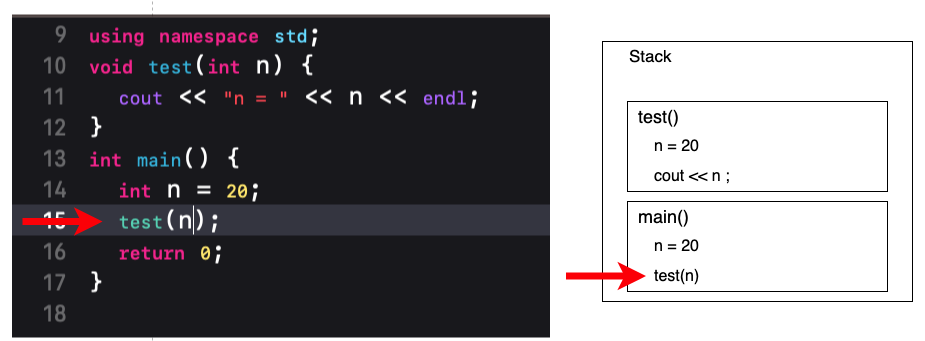
main()函式,把20複製給test()空間的n變數,test()空間的n變數與main()空間的n變數是不相同。
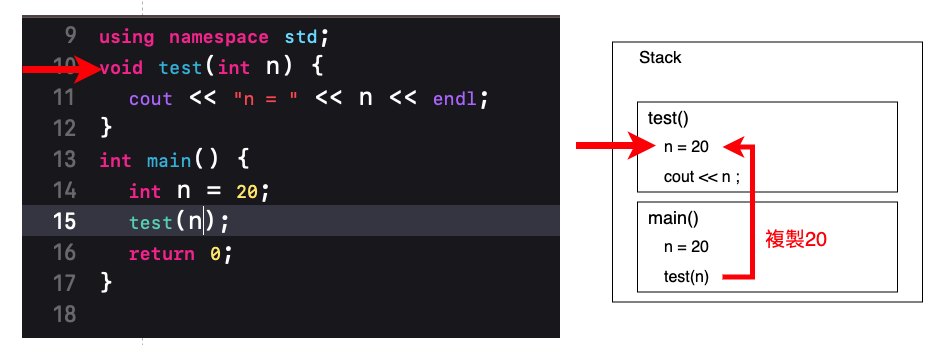
test()函式呼叫cout 印出 n。
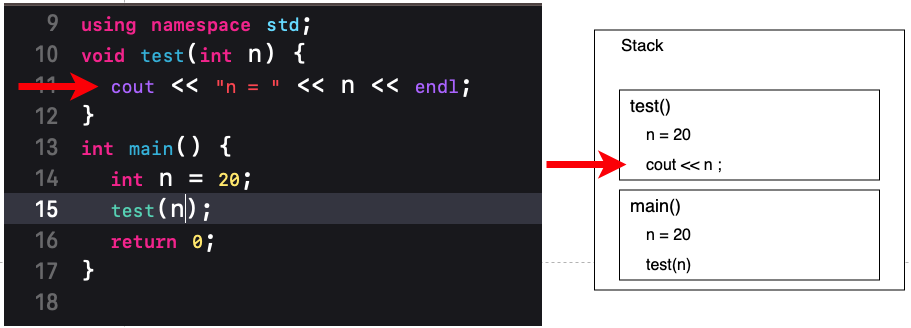
test()函式全部執行完畢,在Stack中的test()函式空間會被記憶體釋放,回到main()函式中,呼叫test()的那一行。
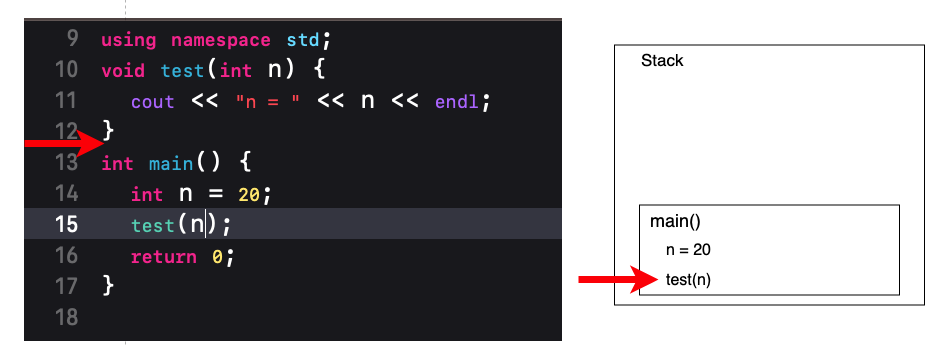
1
2
3
4
5
6
7
8
void test(int n) {
cout << "n = " << n << endl;
}
int main() {
int n = 20;
test(n);
return 0;
}
印出結果:n=20
函式中的變數
下圖中,main()函式中的n,與test()函式中的n,二者各自獨立,cout印出的都是自己函式中的n,不會跨界印出其它函式中的n。
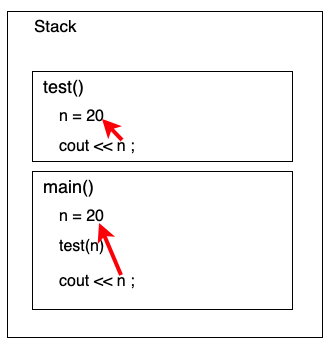
函式不能使用其它函式的區域變數
以下會編譯不過,main()函式本身是沒有n變數,main()函式無法存取test()函式中的n變數。
二者在不同的空間。
1
2
3
4
5
6
7
8
void test(int n) {
cout << "n = " << n << endl;
}
int main() {
test(20);
cout << "n = " << n << endl;
return 0;
}
函式複製基本型態參數
呼叫函式時,若參數為基本型態,是「複製」值。
以下程式是把20複製給test()函式中的n變數,再進行n++,但test()函式中的變數n跟main()函式中的變數n二者是不同的,各自存在不同的空間,離開test()空間後,test()空間與n變數會被記憶體釋放,回到main函式後,main的n變數仍是20,因為二者為不同空間的變數,修改test()函式中的n,不會跟著修改main()函式中的n。
1
2
3
4
5
6
7
8
9
10
void test(int n) {
n++;
cout << "n = " << n << endl;
}
int main() {
int n = 20;
test(n);
cout << "n = " << n << endl;
return 0;
}
n = 21
n = 20
隱藏的return
當test()函式執行到最後,會有一個隱藏的return,返回呼叫test()函式的「位置」。
1
2
3
4
5
6
7
8
9
10
11
12
void test(int n) {
n++;
cout << "n = " << n << endl;
// 隱藏的return
return;
}
int main() {
int n = 20;
test(n); // return返回的位置
cout << "n = " << n << endl;
return 0;
}
接收return
如果函式有return傳回值,就會把test()函式的值,傳回main函式,並且「要有變數去接收」傳回值,傳回值就會影嚮main()函式的變數值。
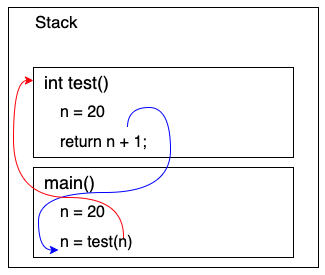
1
2
3
4
5
6
7
8
9
int test(int n) {
return n + 1;
}
int main() {
int n = 20;
n = test(n);
cout << "main() n = " << n << endl;
return 0;
}
main() n = 21
return傳回值會取代原本test(n)的程式碼,直接由21取代,參考下圖。
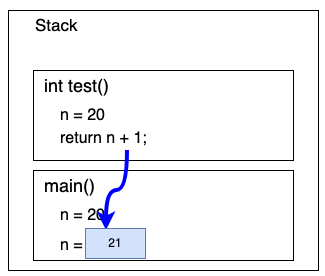
如果沒有變數去接收,不會修改main()函式的變數值。
執行結果n仍是20。
1
2
3
4
5
6
7
8
9
10
using namespace std;
int test(int n) {
return n + 1;
}
int main() {
int n = 20;
test(n);
cout << "main() n = " << n << endl;
return 0;
}
main() n = 20
複製記憶體位址
若要讓test()函式可以修改main()函式的n變數。
需要使用「記憶體位址」的方式。
把「記憶體位址」傳入test()函式,要使用「指標類型」,才可以把main()函式的n變數的記憶體位址「複製」到test()函式。
下圖中,test()函式中的n變數,記憶體位址是0x000008,存的「值」是記憶體位址0x000001。
main()函式中的n變數,記憶體位址0x000001,存的「值」是20。
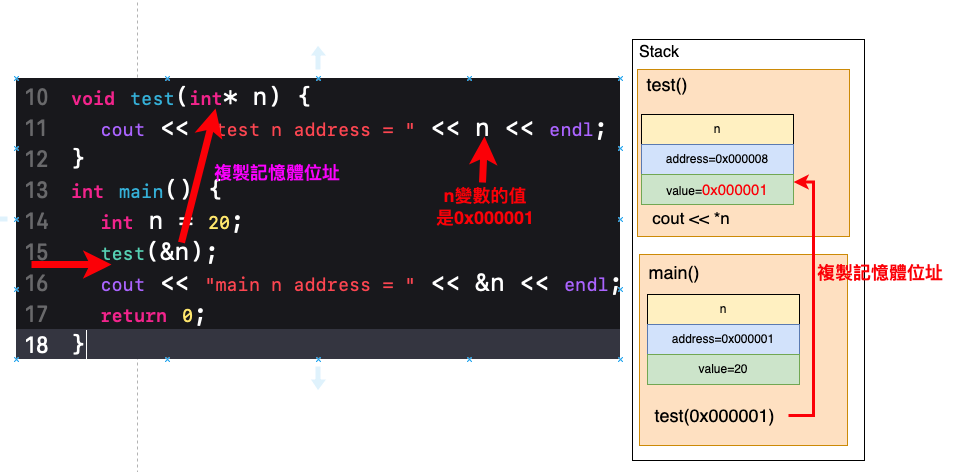
1
2
3
4
5
6
7
8
9
void test(int* n) {
cout << "test n address = " << n << endl;
}
int main() {
int n = 20;
test(&n);
cout << "main n address = " << &n << endl;
return 0;
}
test n address = 0x000001
main n address = 0x000001
取得其它函式中的值
test()函式中的n變數,記憶體位址是0x000008,存的「值」是記憶體位址0x000001。
透過對「記憶體位址」使用*取值運算子,可以取出記憶體位址中的「值」。
*0x000001,取出0x000001記憶體位址存放的「值」20。
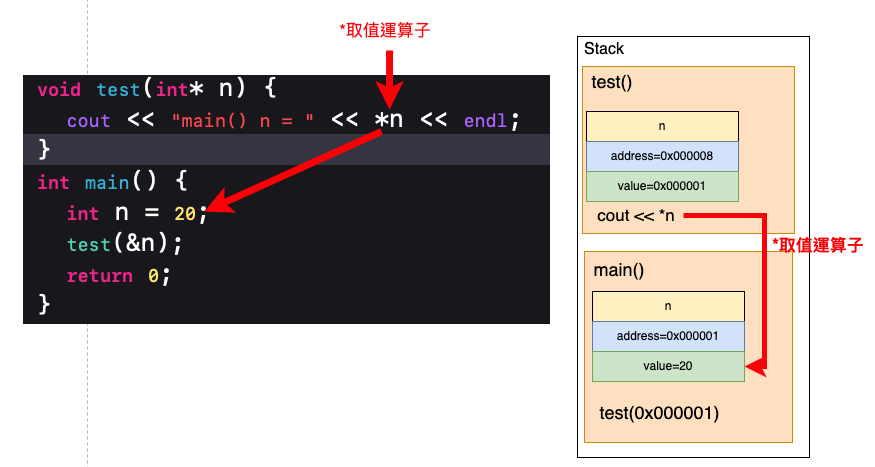
1
2
3
4
5
6
7
8
void test(int* n) {
cout << "main() n = " << *n << endl;
}
int main() {
int n = 20;
test(&n);
return 0;
}
main() n = 20
修改其它函式中的值
透過對「記憶體位址」使用*取值運算子,可以對記憶體位址的值進行修改的操作。
*0x000001先把記憶體的「值=20」取出來。
20++的意思就是把20 + 1,再把21存入0x000001記憶體位址的值。
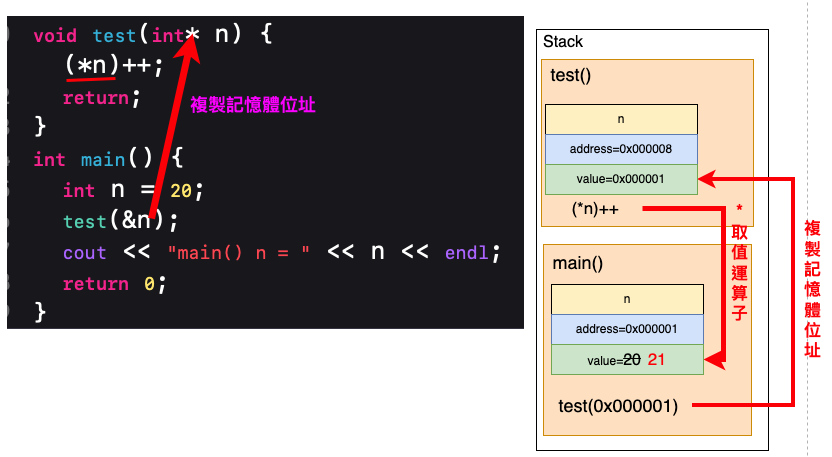
交換
如果函式參數是基本型態,就無法修改其它函式中的變數。
1
2
3
4
5
6
7
8
9
10
11
12
13
void swap(int n1, int n2) {
int temp = n1;
n1 = n2;
n2 = temp;
printf("swap() n1 = %d, n2 = %d \n", n1, n2);
}
int main() {
int n1 = 5;
int n2 = 10;
swap(n1, n2);
printf("main() n1 = %d, n2 = %d \n", n1, n2);
return 0;
}
swap() n1 = 10, n2 = 5
main() n1 = 5, n2 = 10
如果函式參數是指標(記憶體位址),複製傳入參數為記憶體位址,就可以修改其它函式中的記憶體位址中的「值」。
1
2
3
4
5
6
7
8
9
10
11
12
13
void swap(int* n1, int* n2) {
int temp = *n1;
*n1 = *n2;
*n2 = temp;
printf("swap() n1 = %d, n2 = %d \n", *n1, *n2);
}
int main() {
int n1 = 5;
int n2 = 10;
swap(&n1, &n2);
printf("main() n1 = %d, n2 = %d \n", n1, n2);
return 0;
}
swap() n1 = 10, n2 = 5
main() n1 = 10, n2 = 5
函式區域變數
在函式中的變數是區域變數。
若與全域變數是相同名字,函式會採取就近原則,使用函式中的區域變數。
1
2
3
4
5
6
7
8
9
int n1 = 5;
void test() {
int n1 = 100;
printf("test() n1 = %d \n", n1);
}
int main() {
test();
return 0;
}
test() n1 = 100
區域變數初始值
函式中的區域變數要設初始值。
「全域」變數會根據基本型態設定對映的初始值,如:int是0,char是\0,「全域」變數是整個程式都可以共享,可以放在標頭檔.h,但只能被include一次。
函式中的區域變數不會設定對映的初始值,如果不設初始值,會有亂七八糟的值,甚至造成程式執行失敗。
1
2
3
4
5
6
7
8
9
10
11
12
// 全域變數,沒設初始值,預設為0
int n2;
void test() {
// 區域變數沒設初始值,預設為亂七八糟的值。
int n1;
printf("test() n1 = %d \n", n1);
printf("test() n2 = %d \n", n2);
}
int main() {
test();
return 0;
}
test() n1 = 32759
test() n2 = 0
從執行結果,可以知道區域變數與全域變數的預設值有很大不同。